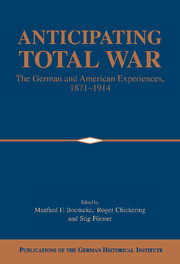Book contents
- Frontmatter
- Introduction
- Part One Germany, The United States, and Total War
- 1 Total War: The Use and Abuse of a Concept
- 2 Different Path to War: A Comparative Study of Militarism and Imperialism in the United States and Imperial Germany, 1871-1914
- Part Two War and Society
- Part Three Memory and Anticipation: War and Culture
- Part Four The Experience of War
- Index
1 - Total War: The Use and Abuse of a Concept
Published online by Cambridge University Press: 05 January 2013
- Frontmatter
- Introduction
- Part One Germany, The United States, and Total War
- 1 Total War: The Use and Abuse of a Concept
- 2 Different Path to War: A Comparative Study of Militarism and Imperialism in the United States and Imperial Germany, 1871-1914
- Part Two War and Society
- Part Three Memory and Anticipation: War and Culture
- Part Four The Experience of War
- Index
Summary
Military history has largely escaped the methodological assaults that have been launched in the name of the “linguistic turn.” The decentering of the historical subject, the constitutive function of language, and the discursive construction of meaning have unsettled the history of class, gender, and ethnicity to a much greater extent than they have the history of the battlefield. This state of affairs appears to vindicate Gordon Craig's long-standing complaint about the disdain with which social and cultural historians have regarded military history, although recent studies of industrial war's impact on relations of class and gender have betrayed significant traces of the new methodologies in the history of the home front. But battlefield operations are evidently secure. Here questions of meaning and significance are resolved in troop movements, casualties incurred, or objectives seized - terms that seem, methodologically at least, unproblematic.
The security is deceptive. In even its most basic operational varieties, the history of military affairs is as much wedded to language and the discursive construction of meaning as is any other genre of historical writing. Here it suffices to note that modern military history has been governed for the better part of the twentieth century by a “master narrative.” It is emplotted in the concept of total war.
- Type
- Chapter
- Information
- Anticipating Total WarThe German and American Experiences, 1871–1914, pp. 13 - 28Publisher: Cambridge University PressPrint publication year: 1999
- 21
- Cited by



